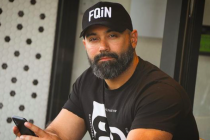In the corner of a large Cambridge cemetery lie a handful of overgrown graves of men who were wounded or fell at Gallipoli / Çanakkale during the First World War. That was the epic campaign won so brilliantly against global opposition by Turkiye’s founding father, Mustafa Kemal Atatürk.
It was also famous for the lasting respect and admiration which grew up between Turkish troops and some of their opponents, particularly the troops sent to fight them from Australia and New Zealand, collectively known as ANZAC (Australian and New Zealand Army Corp).
At some points of the rugged battle ground, only a few yards separated the two front lines, and these speedily became heaped with the bodies of the dead and dying. But Turkish troops would allow regular breaks in the fighting, so that both sides could bury their dead with dignity, and there is plenty of evidence that Turks and ANZACS helped each other in this grim duty, as well as throwing tins of cigarettes and ‘bully’ beef (aka corned beef) at each other during lulls in the fighting.
One lesser known fact of this historic battle is that ANZACS rejected the gas masks they were issued, because they were sure Turks would never use poison gas against them, nor torture them; and indeed, neither of these things ever happened.
“There is no difference between the Johnnies and the Mehmets”
When the war was over, Atatürk uttered his famous words: “Those heroes that shed their blood and lost their lives, you are now lying in the soil of a friendly country. Therefore, rest in peace. There is no difference between the Johnnies and the Mehmets to us where they lie side by side, here in this country of ours.”
“You, the mothers who sent their sons from far-way counties, wipe away your tears. Your sons are now lying in our bosom and are in peace. After having lost their lives on this land, they have become our sons as well.”
Thankfully, Turkiye played a neutral role in World War Two, and no Turks died; but ANZACS fought in their thousands.
Recently it was discovered that 330 ANZAC airmen were also buried in that Cambridge City Cemetery, because of all the RAF bomber bases that used to surround it; and so the idea of commemorating their presence on ANZAC Day was established, together with their comradeship with Turkish soldiers, as happens each year in Australia and New Zealand.
The Turkish Embassy in London was approached, and readily agreed to send a representative to the inaugural event in 2017. Wing Commander Onur Kıyıcı, Defence Attaché at the Embassy, took part in the proceedings, laying a wreath on behalf of the Turkish nation, and reciting the words of Atatürk. This engagement continued for several years before the Covid pandemic in 2020 put a stop to such gatherings.
Cambridge’s ANZAC Day resumed in 2022 and this year’s Parade was attended by the Lord Lieutenant of Cambridge, representing King Charles III, and the High Sheriff of Cambridge. The Lord Mayor of Cambridge and Air Chief Marshal Sir Michael Graydon were also there, among other dignitaries.
Atatürk’s profound words were printed as usual in the Order of Service, but there was no Turk to read them. The Turkish National Anthem was also printed there – and played twice by an excellent brass band – but not a single Turkish voice was lifted in reply, because not a single Turkish person attended the ceremony.
T-VINE has seen correspondence dating back to early February this year requesting a participant from the Turkish Embassy for this year’s event in Cambridge, giving plenty of time to appoint a suitable representative. Sadly it was not to be.
And while His Excellency Koray Ertaş, the Turkish Ambassador, did attend the main Westminster Abbey Service of Commemoration and Thanksgiving to mark ANZAC Day, the absence of Turks at the Cambridge ceremony was felt all the more keenly.
ANZAC Day is far more than a remembrance event; it underlines the historic bond and ongoing friendship that exists between Turkiye, Britain, Australia and New Zealand. It provides a poignant opportunity to educate young people from all four nations about this critical battle and the huge losses they incurred, while acting with dignity and respect even in warfare. And it also offers the participants positive publicity.
Let’s hope the Turks don’t neglect their friends in Cambridge for ANZAC Day next year.
Main image, top, of Sir Michael Graydon laying a wreath at Cambridge’s ANZAC Remembrance Service in April 2022. Photo via X/ High Sheriff Cambs
Read More
Turkish-ANZAC bonds renewed in Cambridge, 2 May 2017





